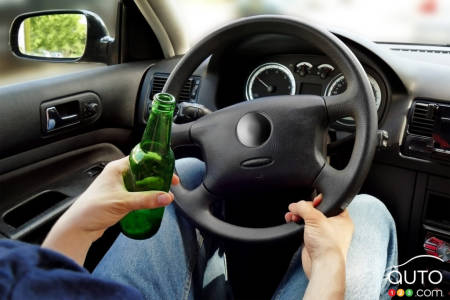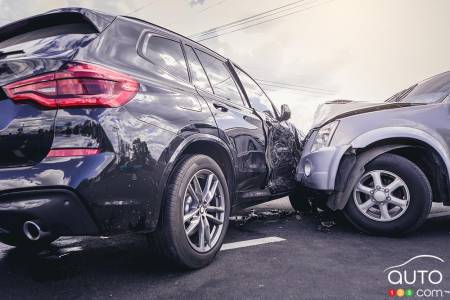In collaboration with Promutuel
Driving comes with a fair amount of unpredictability. Anyone can cross paths with a dangerous driver. Has this happened to you and you didn’t know what to do? As always, we’re there to help you better understand this behaviour and know how to respond.
What is dangerous driving? How should you report an incident? How does dangerous driving affect someone’s car insurance? Read on for the answers to these important questions and find how you can help make the roads safer for everyone.
WHAT IS DANGEROUS DRIVING?
According to SAAQ, dangerous driving means “driving recklessly and exposing others to unacceptable risks.” Essentially it means driving a motor vehicle in a way that poses a threat to the public by endangering people’s lives or safety. It is an offence that is punishable by law. Depending on the seriousness of the act and its consequences, a motorist driving dangerously may violate Québec’s Highway Safety Code as well as the Criminal Code, which is a federal statute. The consequences of such a violation can range from a fine to licence suspension or revocation to imprisonment, depending on the situation.
Examples of dangerous driving
Now you have a better idea of what dangerous driving means. Here are some examples to make it even clearer:
Speeding – Speeding is the cause of many accidents. Motorists who exceed the speed limit to such an extent that they expose others to an unacceptable risk are committing the offence of dangerous driving. If this behaviour takes place in a school zone during school hours, for example, or in a work zone, it is even more reckless.
Driving drunk − Note that dangerous driving and drunk driving are two separate offences. Someone may be accused of both, because driving while impaired is often a danger that puts others’ safety at risk.
Dangerous passing or passing in no-passing zones − Some forms of passing, especially when combined with speeding, constitute dangerous driving. Drivers who weave through traffic not only frighten other motorists but can also endanger them.
Texting behind the wheel − Distracted driving is now the leading cause of accidents in Québec, and cellphones are the number one culprit according to a SAAQ study. It is illegal and dangerous to hold your phone while driving, and the consequences can be dire.
Ignoring traffic signals (e.g., running red lights) and racing on public roads are also examples of dangerous driving. Remember that the definition of dangerous changes with the conditions. For example, a prudent, sensible driver must take weather conditions into account. You don’t drive the same speed in the middle of a snowstorm! Basically, if someone is accused of dangerous driving, a judge will look at all of the factors to decide if the person is guilty or not.

HOW TO REPORT DANGEROUS DRIVING
If you see someone driving dangerously, what should you do? How do you report drunk driving, reckless speeding, or other dangerous behaviour? While police officers encourage people to report these things, there is a right way and a wrong way to do it. Here are some tips:
Don’t try to be a hero – Do not attempt to intercept the driver yourself. Do not take justice into your own hands and pursue the car. Such a rash impulse could put you and others in danger and cause you to commit an offence as well!
Gather as much information as possible – In order to be useful, your report must enable police officers to act quickly or investigate effectively and identify the person behind the wheel. Important information includes licence plate number, vehicle make, model, and colour, description of the driver, passengers in the vehicle, where you saw it, and what direction it was going. When you witness dangerous driving, you should provide as much information as possible. Any passengers in your vehicle can also help you by taking photos or noting other information.
Alert the police – First, pull over to a safe location. You can also ask a passenger to call the police. If you are on a highway or a Québec road, contact Sûreté du Québec by dialing *4141 on your cell or 310-4141 on a home or pay phone. On municipal roads, dial 911.
Types of report
Depending on the case, your report may lead to an immediate action or a police investigation. If you witness dangerous driving, you can file an anonymous report. You are not required to identify yourself or file a complaint. The information you provide can still be helpful for intercepting the driver. As a witness, you may also decide to file a complaint with the police. By becoming a complainant you provide a great deal of assistance to the police. If what you reported warrants a lawsuit against the dangerous driver, your testimony will be invaluable or even essential if the police did not observe the violation themselves.
Road rage
How do you report road rage? First of all, stay calm. Do not say anything to the driver, and most importantly do not provoke the person. Be very cautious. The aforementioned advice applies here as well.

HOW DOES DANGEROUS DRIVING AFFECT CAR INSURANCE?
People convicted of dangerous driving may have a hard time taking out insurance or may have to pay a lot for it. Insurers ask a variety of questions, and a criminal record, licence suspension or revocation, demerit points, etc. are all factors they take into consideration when assessing risks and setting rates. The opposite is true as well. Good driving habits are rewarded by a number of insurers. Promutuel Insurance, for example, offers a telematics program that gives good drivers (who obey the speed limit, brake gently, and accelerate gradually) a discount on their car insurance. All across Québec, car insurance premiums have been on the rise in recent years, largely due to distracted driving. So we all have a part to play to help reduce car insurance rates.
Now you know how best to respond if you see someone driving dangerously. You can join in the collective effort to keep our roads safe. Reporting dangerous driving also has a deterrent effect, which over time can reduce the number of offences.




